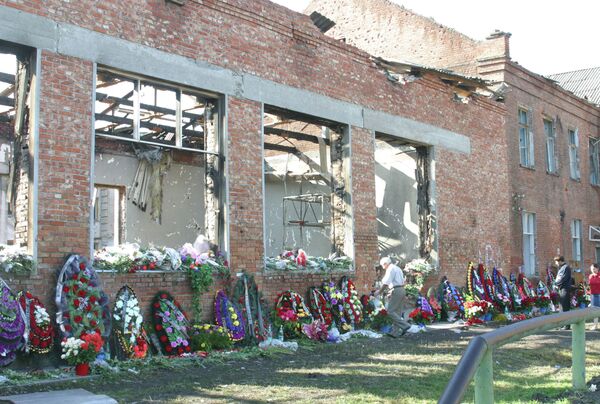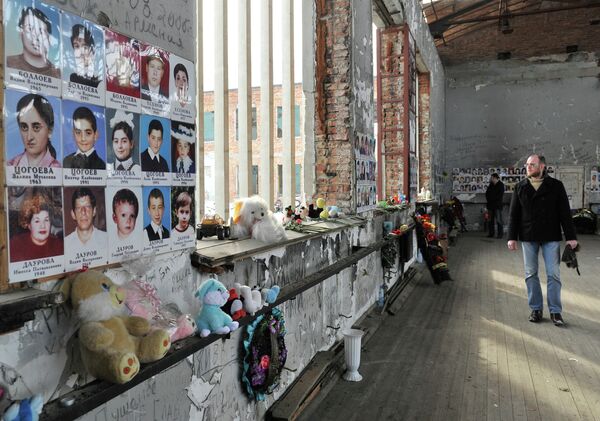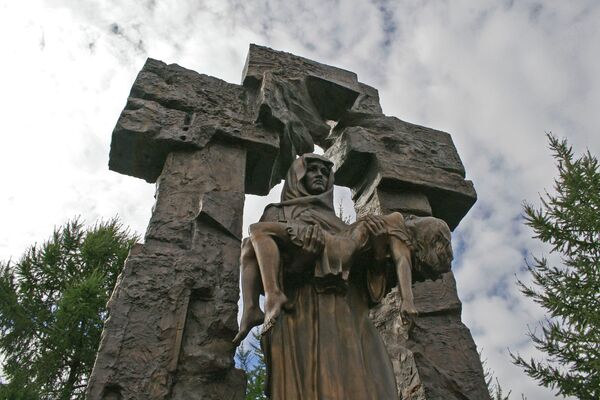VLADIKAVKAZ, August 29 (RIA Novosti) - Ten years ago, on September 1, 2004, the small, ordinary, town of Beslan in Russia’s North Ossetia suddenly found itself thrust into the spotlight of the entire world, when its school was invaded by terrorists.
Ten years ago, on September 1, 2004, the small, ordinary, town of Beslan in Russia’s North Ossetia suddenly found itself thrust into the spotlight of the entire world, when its school was invaded by terrorists. It remains unknown why the group of terrorists who were recruited by the leaders of extremists operating in the neighboring Russian republics of Chechnya and Ingushetia specifically chose to target Beslan School No 1 and hundreds of innocent children, their parents and teachers.Within mere seconds, the criminals took over 1,200 people hostage, and kept them captive without food or water for three long days.
In Russia, the first of September is the first day of the school year if it falls on a week day. The students of Beslan’s School #1 had assembled with their parents and teachers for the occasion. For hundreds of them, it would mark a turning point, the beginning of an ordeal which would haunt them for the rest of their lives. For 335 of them, the majority of whom were children, it was an ordeal which they would never escape.

Vika Guseinova is one of the few survivors of the terrorist attack who is eager to talk to journalists.
“I was not going to go to school that day. But I was the head student in my class and we were supposed to hand out presents, so my teacher asked me to come despite all of my excuses.
After my friend and I entered the schoolyard, we went to meet our classmates. I had made just one step through the revolving gates before I noticed something strange going on.
If I had turned around and left, it would have been all over. But I did not understand what was going on. The next moment, I nonetheless turned around, but someone was already behind me, telling me: “Run on!” In that mere split-second, the territory [of the school] was sealed off.
We ran into the school boiler-room. But someone followed us and forced us to leave. When I went out I saw that they were pushing people into the school building in any way they could – through doors and windows.
They started setting out explosive devices and there was a whisper that we were being taken hostage…and then they confirmed that we were their hostages. At that time I was an 11th grader – it was my last year of school - but I had gotten used to seeing everything through rose-colored glasses and did not have the slightest idea what terrorists were and what it meant to take hostages.
At first, the terrorists would let their hostages into a cloakroom near the gymnasium where we could have some drinking water. But the pipes started leaking and they started bringing buckets of water with cloth floating in them into the gym. We then had to suck water out of [the cloth]. In the evening, it started raining a little and there was a mild wind.
But the second day was a nightmare. The morning was very hot and nobody gave us water. Some people started to lose their wits and started drinking their own urine; some got groggy. There was a girl sitting next to me who kept calling me her mother – “You are my mother, you are my mother”. But I kept answering that I was not her mother.
Then a boy started asking me: “We will die, won’t we?” I answered that we won’t, but he insisted: “I know we will die”. And then it struck me: if a little boy thinks we will die, then we are definitely going to die.
The terrorists forced the people to hold their hands above their heads like bunny ears and threatened to shoot 20 people if there were no silence in the gym. We were forbidden from moving around. I raised my hand for permission to use the toilet. I was allowed to. And mothers who were sitting around me begged to take their children as well.
I thought that there was a toilet next to the gym and that I could drink water out of a toilet bowl. All I could think about was water. Children were not drinking urine in order to avoid vomiting.
Meanwhile, everyone was talking about death. What was going on in the gym was unbearable. The terrorists were yelling at us and throwing us cloth as if we were dogs. The children rushed to suck the cloth in order to get at least a drop of water. I saw that nightmare in my dreams for a long time afterwards.
And then apathy came on the third day. People were not reacting to the terrorists’ yelling. It seemed that mothers around me were clutching children who had died of dehydration. We were unable to cry any more. Everyone was ready for the end. And everyone dreamed of this to be over.
I got ready for something to happen. I saw a girl next to me and told her: “Take off your glasses, there is going to be an explosion and you will lose your eyes”. I have no idea why I was so sure there was going to be an explosion or that she would survive. I pulled myself together, lowered my head and the next moment I realized that I was flying in the air.
When I opened my eyes, I saw someone’s shoe near me, then a partially decapitated body with blood dripping from it. I had a broken shoulder blade; I could not move my hand and I couldn’t stand up. I felt one of my eyes was swollen. I wanted to touch it with my hand but then I realized there was a piece of iron lodged in my head.”
The terrorists started hustling everyone who was still able to walk into a school hall on the second floor. While getting out of the gym, Vika saw the two-year-old son of her teacher. His older brother, a first grader, and his mother had died in the explosion. The girl took the boy with her. But suddenly there was another explosion in the school hall, and everyone was shoved into the school dining room. The windows had bars on them; there was no way for them to escape.
“There were 50 of us squeezed into a small kitchen. And then the military, not knowing there were hostages in the kitchen, started firing and we were caught in the crossfire.
A special forces officer was trying to get into the building through a window where the bar had been sawed. But after seeing him, one of the terrorists threw something into the crowd. I did not understand what it was. But the officer jumped right out of the window to cover the object with his body. A second later, there was an explosion. His name was Andrei Turkin, and he had covered a grenade with his body. Thanks to him, many people survived.
The next moment, I saw a partially decapitated girl who had been standing next to me only a second before. But then more officers got into the building and started pulling people out. They did not notice me straight away, I thought I was crying out loudly, but apparently I wasn’t making a sound. But then someone probably should have felt my glance.
Due to the shootout, they started dragging me out by my legs. Despite all of my spinal injuries, I did not feel anything at the moment. It was already afterwards, in a car on the way to a hospital that I started to feel terrible pain.
They thought I was hopeless and said those who could be saved needed their help more. But then one of the doctors decided to operate on me. I had 18 stitches. Afterwards, the doctors did not give up hope; they spent their nights in the hospital.
On September 9, I and other critical patients were airlifted to Moscow.
For two months I was in intensive care, like a “walking corpse”. I had a whole set of different- sized fragments taken out of my body; 18 more remain inside me. I spent the rest of that school year in hospitals. But then slowly I returned to life. All from scratch. I only realized the full extent of the tragedy when I got back home.
At first, it was an eerie fear. I was frightened just to go out; it seemed I would die. It was a serious psychological trauma. I kept asking myself, what had I done? Why had God punished me that awfully?
But people are not used to complaining [in Beslan]; they don’t complain about their sores, or whatever fragments they have stuck inside them, or anything else…any mother of a child who died that day would have been eager to simply see him live, even if he was disabled, and missing a leg or an arm.
I do not remember Beslan before the terrorist attack. That was a childish, worry-free life, and after the attack it all suddenly became very grown-up. Like a 20-year jump forward. I do not remember or perceive my life before the attack. I did not have any life before. But I have a new lease on life going forward.
However, I’ve never wanted to forget what happened. I do not blame anyone and do not want to learn who is to blame. So what, if I do? All I can do for those who are no longer with us it is simply keep them in my memory."


